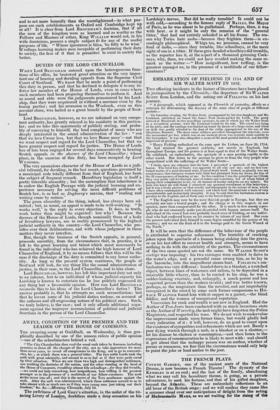DUTIES OF THE LORD CHANCELLOR.
WHEN Lord BROUGHAM entered upon the heterogeneous func- tions of his office, he bestowed great attention on the very impor- tant one of hearing and-aleciding appeals from the Supreme Civil Court of Scotland. We know' that he made a point of performing this duty in person, and that he declined to delegate it to any in- ferior law member of the House. of Lords, even in cases where such members had been preparing themselves to perform it. And so sound and able were the judgments pronounced by his Lord- ship, that they were acquiesced in without a murmur even by the losing parties ; and his accession to the Woolsack, even on this account alone, was hailed as a great benefit by the people of Scot- land.
Lord BROUGHAM, however, as we are informed on very compe- tent authority, has greatly relaxed in his assiduity in this particu- lar; and we take this opportunity of publicly stating, and proba- bly of conveying to himself, the loud complaint of many who are deeply interested in the sound administration of the law : "not that we love Cmsar less, but that we love Rome more"—not that we want respect and regard for the Lord Chancellor, but that we have greater respect and regard for justice. The House of Lords has of late been engaged for several days consecutively in hearing Scotch appeals in the absence of the Lord Chancellor; whose place, in the exercise of this duty, has been occupied by Lord
WYNFORD.
The very anomalous character of the House of Lords as a judi- cial tribunal, for deciding, in the last resort, questions governed by a municipal code totally different from that of England, has been the subject of frequent remark. Hereditary legislation is itself a pretty tolerable absurdity ; but the assumption that inheritance is to endow the English Peerage with the judicial learning and ex- -perienee necessary for solving the most difficult problems of Scotch law, is as bad as Dogberry's maxim, that "reading and writing come by nature." The gross absurdity of the thing, indeed, has always been ad- mitted; but, as usual, an appeal is made to its well-working. "It works well," is the reply to every objection. It does, in truth, -work better than might be expected : but why ? Because the decrees of the House of Lords, though nominally those of a body of hereditary lawyers, are in reality pronounced by the highest judicial authority in the country—the Lord Chancellor, who pre- sides over their deliberations, and with whose judgment in these matters they never interfere. But, though the business of the Scotch appeals, in general, proceeds smoothly, from the circumstance that, in practice, it is left to the great learning and talent which must necessarily be found in the individual who has achieved the high honour of Lord Chancellor of England, it by no means follows that this will be the .case if the discharge of the duty is committed to any lower autho- rity. As long as the present system continues, the people of Scotland will look, for any thing like the sound administration of justice, in their case, to the Lord Chancellor, and to him alone. Lord BROUGHAM, however, has left this important duty not only to an inferior, but to an individual of whose judicial capacity his Lordship is known to entertain (as he has publicly expressed it) any thing but a favourable opinion. How can Lord BROUGHAM reconcile this to his ideas of the Lord Chancellor's duties ? The .answer probably is, that he attempts no such reconciliation ; but that he leaves some of his judicial duties undone, on account of the arduous and all-engrossing nature of' his political ones. Such, we truly believe, is the case ; and it only affords additional argu- ment against the improper accumulation of political and judicial functions in the person of the Lord Chancellor.


























 Previous page
Previous page